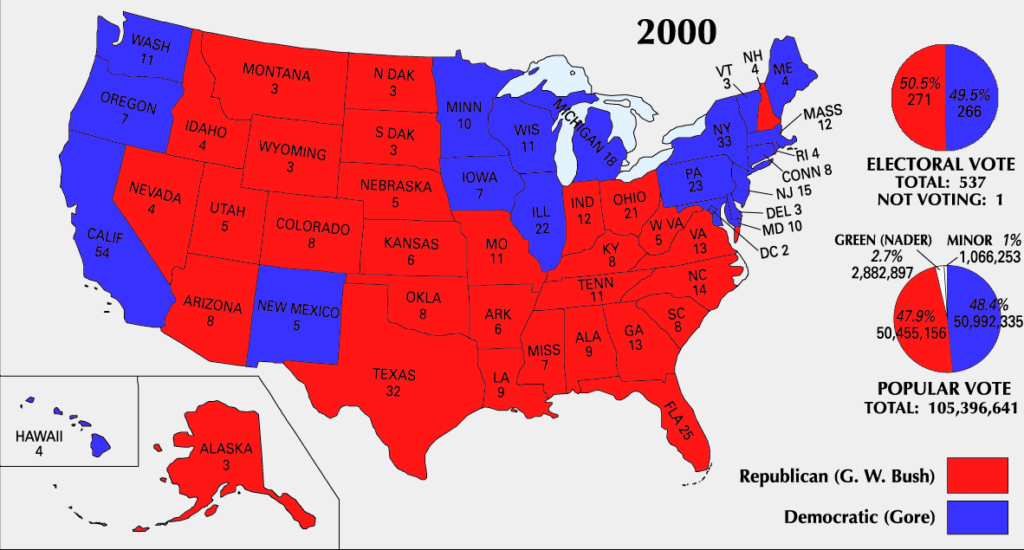In the election of 1996, President Bill Clinton easily defeated Bob Dole. His popularity, coupled with his success in a centrist policy, brought many moderate voters to his side. However, his second term would not be so easy.

Clinton became engulfed in a scandal that would cloud his presidency and almost lead to him being impeached before the end of his term. Although he would survive the impeachment trial, it would hurt the Democratic party in the upcoming election.
Shortly before the Presidential Election of 2000, Republicans would engage in a competitive primary that led to the victory of George W. Bush, the son of George H. W. Bush, whom Bill Clinton had defeated eight years prior in the election of 1992.
This election would be one of the most competitive elections in American history.
The candidates were as follows:
Republicans: George W. Bush and Vice President Dick Cheney
Democrats: Al Gore and Vice President Joe Lieberman
Platforms
Republicans: Bush focused on domestic reform and foreign policy. He was critical of the acts used in Somalia and said that the military should not be used for "nation-building." He also said he wanted to bridge the gap politically as Americans had become increasingly divided. The Republicans also criticized the Clinton administration for the embarrassment of the sex scandal that plagued his second term.
Democrats: Gore attacked Bush and claimed he did not have enough experience for the job. However, Gore had a hard time getting out from under the Clinton scandal that rocked the nation. Despite being a faithful husband and the Clinton administration's successful domestic policies, Gore was forced to distance himself from anything that was attached to Bill Clinton.
Outcome
There was a gaffe in which Al Gore said he "invented the internet," which was used against him, but things withstanding Gore ran a good campaign. He had an uphill battle due to the Clinton scandals, but Gore was able to distance himself from the immorality and focus on policy.
Gore, at the time, was a moderate Democrat, which appealed to many independents who liked the current economy and did not want change. However, there were many voters, specifically Evangelicals, who wanted a Republican in the office to place conservative justices on the Supreme Court.
The election was close and really came down to the debates.
Debates are rarely won based on the issues but rather the perception. Some examples of this are as follows:
- The Nixon-Kennedy Debate in which Richard Nixon clearly knew the issues but came across as stiff, while Kennedy came across as relaxed. Those who listened to the debate on radio believed that Nixon won, but those who watched it on television thought Kennedy had won. I watched it on television. John F. Kennedy went on to win the election of 1960.
- In the Election of 1984, Ronald Reagan clearly lost the first debate, and in the second debate, began the debate with humor in which he used his age against Walter Mondale, who was much younger. This joke caused everyone to laugh, including Mondale. Reagan went on to win in a landslide we will probably never see again.
- In the Election of 1992, it was Bill Clinton's empathetic response to a citizen at a Town Hall that made him appear to understand Americans, while George H. W. Bush came off as distant.
In the election of 2000, a similar thing happened. It had nothing to do with the question asked, but rather Al Gore's response to George W. Bush when Bush begins to answer a question (he actually avoids answering the specific question) and Gore then invades his personal space to intimidate Bush and Bush responds with a head nod that caused everyone to laugh. Here is a video of that moment.
Bush went on to defeat Gore in a contested election that came down to the state of Florida.
Florida was first called for Gore, then retracted and given to Bush, and was again retracted and placed as an undecided. After all the votes were tallied, the State of Florida was won by Bush with a margin of 930 votes. Vice President Al Gore would demand a hard count of the votes that would eventually lead to a Supreme Court case, Bush v Gore, in which he would ultimately lose.
Shortly after taking office, terrorists struck on September 11, 2001, which would alter Bush's first term.
